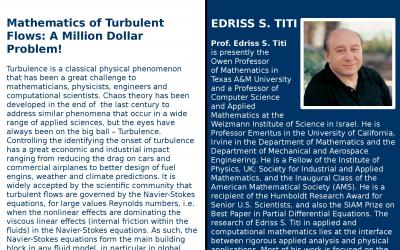Turbulence is a classical physical phenomenon that has been a great challenge to mathematicians, physicists, engineers and computational scientists. Chaos theory has been developed in the end of the last century to address similar phenomena that occur in a wide range of applied sciences, but the eyes have always been on the big ball – Turbulence.Controlling the identifying the onset of turbulence has a great economic and industrial impact ranging from reducing the drag on cars and commercial airplanes to better design of fuel engins, weather and climate predictions. It is widely accepted by the scientific community that turbulent flows are governed by the Navier-Stokes equations, for large values Reynolds numbers, i.e. when the nonlinear effects are dominating the viscous linear effects (internal friction within the fluids) in the Navier-Stokes equations. As such, the Navier-Stokes equations form the main building block in any fluid model, in particular in global climate models. Whether the solutions to the three-dimensional Navier-Stokes equations remain smooth, indefinitely in time, is one of the most challenging mathematical problems. Therefore, it was identified by the Clay Institute of Mathematics as one of the seven most outstanding Millennium Problems in mathematics, and it has set one million US dollars prize for solving it. Notably, reliable computer simulations of turbulent flows is way out of reach even for the most powerful state-of-the art supercomputers. In this talk I will describe, using layman language, the main challenges that the different scientific communities facing while attempting to attack this problem. In particular, I will emphasize the mathematical point of view of turbulence.
Shuttles are available from IISc (TIFR Center Building, Near Janata Bazaar) and NCBS. For shuttle timings click here.
Special shuttles will also run from RRI to ICTS campus (via IISc) and from NCBS to ICTS campus (via CAM-TIFR). For shuttle timings click here.


